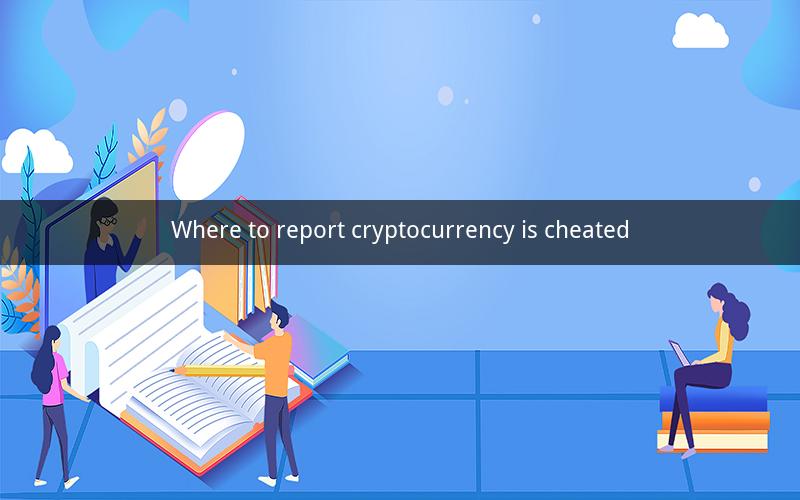
Contents
1. Understanding Cryptocurrency Scams
2. Types of Cryptocurrency Scams
3. Reporting Cryptocurrency Scams
1. Contacting the Exchange
2. Reporting to Regulatory Bodies
3. Using Online Platforms
4. Informing the Cryptocurrency Community
5. Legal Actions
4. Importance of Reporting
5. Conclusion
1. Understanding Cryptocurrency Scams
Cryptocurrency scams have become increasingly prevalent as the digital currency market continues to grow. These scams can range from simple fraud to complex Ponzi schemes, and they often target unsuspecting individuals looking to invest in or trade cryptocurrencies. It is crucial to understand the nature of these scams to effectively report them.
2. Types of Cryptocurrency Scams
- Phishing Attacks: Scammers send fraudulent emails or messages that appear to be from legitimate cryptocurrency exchanges or wallet providers, tricking users into revealing their personal information.
- Ponzi Schemes: These involve promising high returns on investment with unrealistic guarantees, using funds from new investors to pay off earlier investors, which eventually collapses.
- Ransomware: Scammers encrypt a user's cryptocurrency wallet and demand a ransom to unlock it.
- Pump and Dump: Scammers artificially inflate the price of a cryptocurrency, then sell off their holdings, causing the price to plummet.
- Fake Exchanges: Scammers create fake cryptocurrency exchanges to steal users' funds or personal information.
3. Reporting Cryptocurrency Scams
3.1 Contacting the Exchange
If you believe you have been a victim of a scam involving a particular cryptocurrency exchange, the first step is to contact the exchange directly. Provide them with all relevant information, including transaction details and any evidence of the scam.
3.2 Reporting to Regulatory Bodies
Several regulatory bodies around the world are responsible for overseeing cryptocurrency markets and can be contacted to report scams. Examples include:
- United States: Securities and Exchange Commission (SEC), Commodity Futures Trading Commission (CFTC), and the Financial Industry Regulatory Authority (FINRA).
- United Kingdom: Financial Conduct Authority (FCA).
- European Union: European Securities and Markets Authority (ESMA).
- Australia: Australian Securities and Investments Commission (ASIC).
3.3 Using Online Platforms
There are various online platforms where you can report cryptocurrency scams, including:
- CryptoCompare: Allows users to report suspicious activities and exchanges.
- CoinMarketCap: Offers a "Report Scam" feature for users to alert the community about potential scams.
- Reddit: Subreddits like r/CryptoCurrency and r/Bitcoin often have dedicated threads for reporting scams.
3.4 Informing the Cryptocurrency Community
Social media platforms and cryptocurrency forums are excellent places to inform others about scams. By sharing your experience and providing details about the scam, you can help prevent others from falling victim to the same scheme.
3.5 Legal Actions
In some cases, it may be necessary to take legal action against the scammers. This can involve hiring a lawyer to file a lawsuit or seeking assistance from law enforcement agencies.
4. Importance of Reporting
Reporting cryptocurrency scams is crucial for several reasons:
- Preventing Future Scams: By reporting scams, you can help prevent others from falling victim to the same scheme.
- Protecting the Market: Scams can harm the reputation of the cryptocurrency market and deter potential investors.
- Identifying Trends: Reporting scams can help identify patterns and trends in fraudulent activities, allowing authorities to better target their efforts.
5. Conclusion
Reporting cryptocurrency scams is an essential step in protecting yourself and others from falling victim to these fraudulent activities. By understanding the types of scams, knowing how to report them, and emphasizing the importance of reporting, you can contribute to a safer and more secure cryptocurrency environment.
Questions and Answers
1. Q: Can I report a cryptocurrency scam anonymously?
A: Yes, many reporting platforms allow you to report scams anonymously to protect your identity.
2. Q: What should I include in my report of a cryptocurrency scam?
A: Include transaction details, any communication you have had with the scammer, and any evidence you have of the scam, such as screenshots or emails.
3. Q: How long does it take for authorities to respond to a report of a cryptocurrency scam?
A: The response time can vary, but it can take several weeks or even months for authorities to investigate and take action.
4. Q: Can I get my money back if I've been scammed?
A: It is often difficult to recover funds from a cryptocurrency scam, but it is worth pursuing all available options.
5. Q: Are there any cryptocurrency exchanges that offer insurance for scammed funds?
A: Some exchanges offer insurance for certain types of transactions, but this is not common. It's important to check with your specific exchange for details.
6. Q: Can I report a cryptocurrency scam if I'm not sure if it's a scam or not?
A: It's better to report a potential scam than to ignore it. You can provide authorities with the information, and they can determine whether it is indeed a scam.
7. Q: Are there any cryptocurrencies that are more susceptible to scams?
A: All cryptocurrencies are at risk of scams, but some may be more targeted due to their popularity or market value.
8. Q: Can I report a cryptocurrency scam to my local police?
A: Yes, you can report a cryptocurrency scam to your local police, but be aware that they may not have the expertise to investigate these types of crimes.
9. Q: Are there any resources available to help me learn more about cryptocurrency scams?
A: Yes, there are numerous online resources, including educational websites, forums, and social media groups dedicated to helping users learn about and avoid scams.
10. Q: Can I report a cryptocurrency scam if I'm not a resident of the country where the scam occurred?
A: Yes, you can report a cryptocurrency scam regardless of your location. Many regulatory bodies and reporting platforms accept international reports.